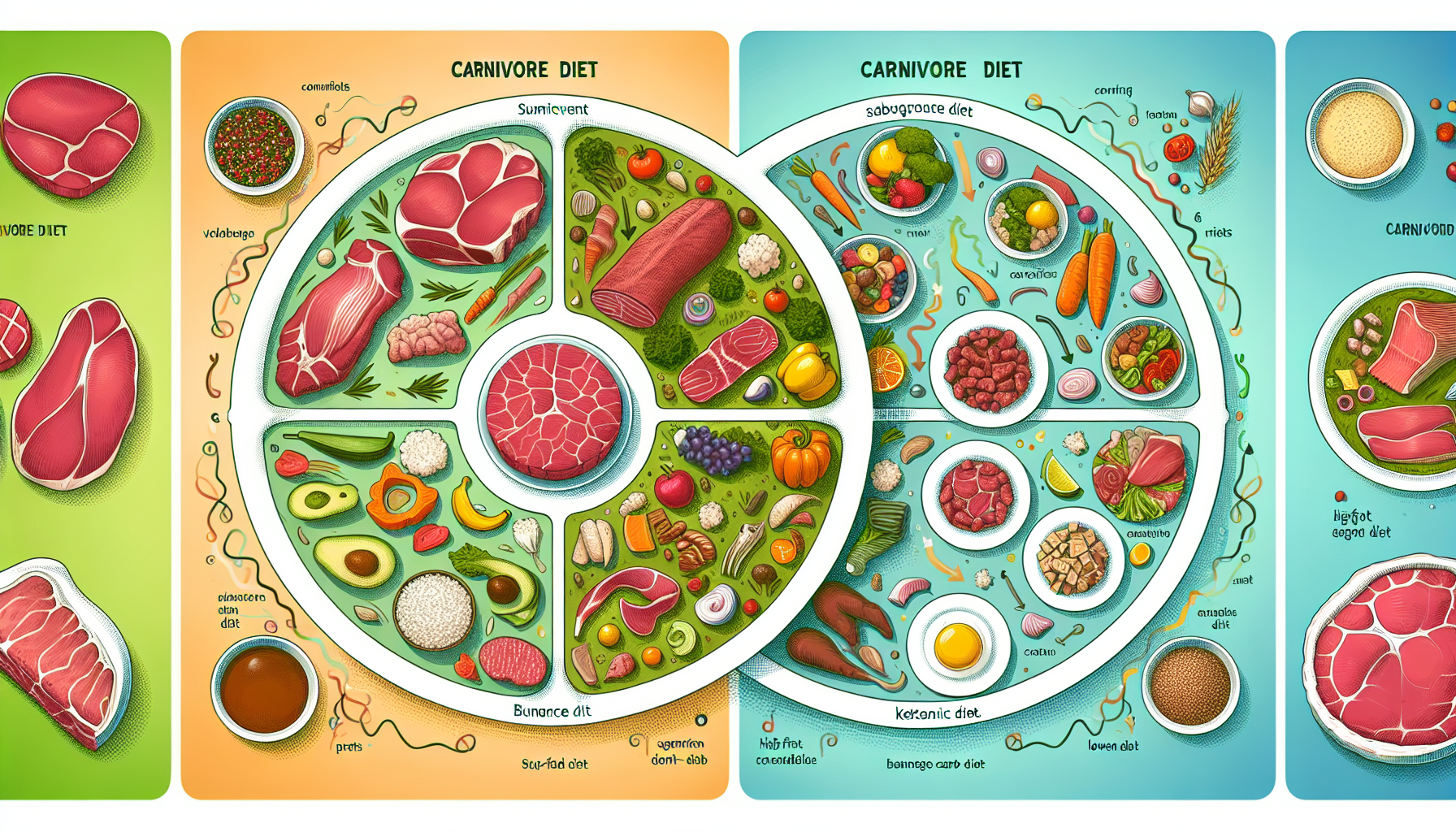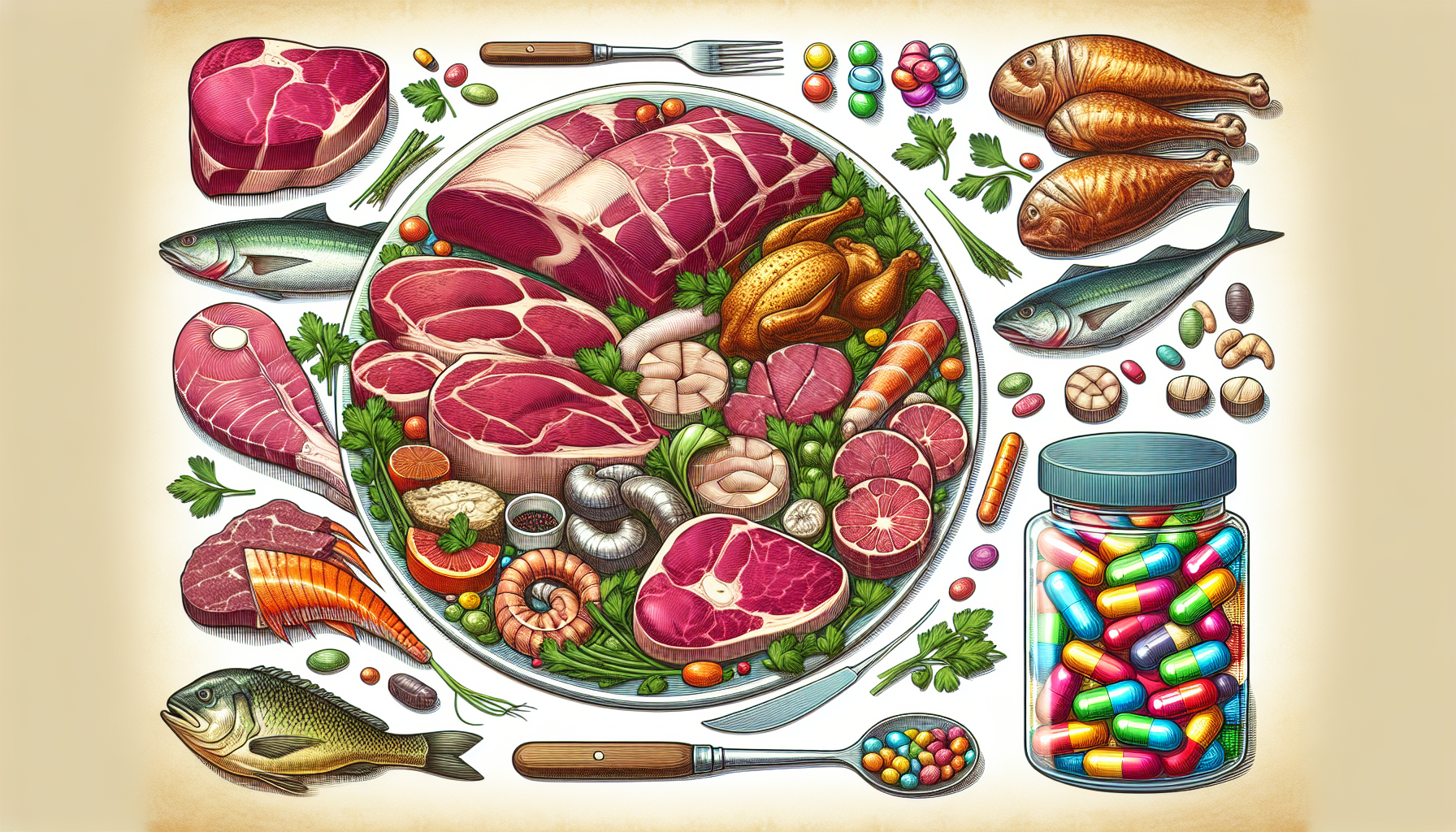Unearthing the Truth: What Is the Secret of Carnivore Diet?

Many wonder what is the secret of carnivore diet, and it often comes down to its strict adherence to ancient eating principles: consuming animal products solely. This introduction prepares you to unravel how the carnivore diet’s singular focus on meat could impact health, grounded in both scientific research and personal testimonies.
Key Takeaways
- The carnivore diet, grounded in evolutionary history, insists on exclusive consumption of animal products and posits that this aligns with physiological needs for optimal health while potentially impacting hormonal balance and providing high nutrient density.
- Real-world testimonials suggest the carnivore diet may contribute to weight loss, improved gut health, and management of autoimmune diseases. However, these are based largely on anecdotal evidence rather than extensive scientific research.
- Critics argue the carnivore diet may pose long-term health risks, like increased chance of heart disease and other ailments due to high saturated fat and cholesterol intake, but individual results vary significantly and more research is needed.
The Science Behind the Carnivore Diet

The carnivore diet, or the all-meat diet, as it’s often called, is exactly what it sounds like. It’s a dietary approach consisting exclusively of animal foods. This means saying goodbye to:
- fruits
- vegetables
- grains
- legumes
- nuts
- seeds
- your favorite dessert
It’s a meat-focused diet that takes eating meat ‘nose-to-tail’ to a whole new level, incorporating everything from muscle meat to organ meats in meals.
From a scientific perspective, the carnivore diet is grounded in our evolutionary history as hunters and gatherers. This diet is also believed to have significant impacts on hormonal balance and nutrient density. While the concept of consuming only meat might sound extreme, proponents of the carnivore diet argue that it aligns with our physiological needs, providing an optimal diet that supports health and well-being.
Yet, understanding the scientific basis of any drastic dietary change, such as this, is vital. Exploring the nutritional profile of the carnivore diet, its bodily effects, and its potential benefits and risks is of utmost importance. The subsequent sections will delve into comprehensive analysis of these facets, including the evolutionary perspective, the impact on hormonal balance, and the nutrient density of animal-based foods.
Evolutionary Perspective
Delving into our past, it’s clear that humans have deep roots as hunters and gatherers. Our ancestors thrived on a diet rich in animal products, supplemented by whatever plant foods were available. This diet provided a high calorific return, essential for survival in harsh environments.
This evolutionary perspective constitutes a key pillar of the carnivore diet. Advocates argue that our bodies are designed to metabolize animal foods efficiently, a trait honed over thousands of years of evolution. They assert that the introduction of agriculture and the subsequent shift towards a plant-dominant diet is a relatively recent development, one that our bodies may not be fully adapted to.
This is not to say that plant foods are detrimental. However, the carnivore diet posits that animal foods, especially organ meats, can provide all the nutrients required for optimal health. It’s a perspective that challenges our traditional understanding of a balanced diet, offering an alternative narrative that aligns our dietary choices with our evolutionary past.
Hormonal Balance
Beyond its evolutionary basis, the carnivore diet also interacts with our body’s hormonal balance. Hormones such as insulin and cortisol, which significantly influence metabolic health affecting aspects from blood sugar levels to stress responses, hold prime importance. By eliminating carbohydrates, the carnivore diet helps to reduce sugar spikes and prevent insulin resistance, a significant factor in the development of diabetes. Furthermore, a study in the American Journal of Clinical Nutrition discovered that a high-fat, low-fiber diet resulted in a 13% increase in total testosterone for men, suggesting potential benefits for hormonal health.
Furthermore, the carnivore diet, which shares similarities with the keto diet, can induce a state of ketosis, contingent on the quantity of fat and protein intake. Ketosis is a metabolic state where the body burns fat for fuel instead of carbohydrates. This not only promotes weight loss but also positively impacts metabolic health.
Nutrient Density
Concerns about the carnivore diet often revolve around nutrient density. How can a diet devoid of fruits, vegetables, and grains possibly provide all the necessary vitamins and minerals? The answer lies in the nutrient-rich nature of animal foods, particularly organ meats.
Organ meats are powerhouses of nutrients, providing a consolidated package of essential vitamins and minerals. They are rich in:
- B vitamins
- Iron
- Zinc
- Protein
- Fat-soluble vitamins
This makes them an integral part of the carnivore diet. Including a diverse range of animal foods, such as bone broth and fattier cuts of meat, can further support the nutrient density of the diet.
Moreover, certain fish and fattier cuts of meat are considered energy-boosting on the carnivore diet due to their high omega-3 fatty acids, protein, ketones, vitamin B, and carnitine content. In essence, while the carnivore diet might appear restrictive, it can provide a dense concentration of vital nutrients when properly planned and balanced.
Success Stories and Testimonials

Having delineated the science behind the carnivore diet, it’s time to look at real-world experiences. Worldwide, numerous individuals adopting this meat-exclusive lifestyle have noticed remarkable health improvements. These success stories and testimonials provide valuable insights into the potential benefits of the carnivore diet, showing how individuals have achieved weight loss, improved gut health, and managed autoimmune diseases.
Among the numerous success stories is:
- Linda, who overcame high blood pressure and hemochromatosis through the carnivore diet
- Larry, another carnivore dieter, who reported a reduction in chronic pain and weight gain after he started following this diet
- Eddie, who successfully healed from Ehlers-Danlos syndrome, a rare genetic disorder, by strictly adhering to the carnivore diet
A survey involving over 2000 respondents noted that adults following the carnivore diet for 14 months reported improvements in health conditions like obesity, hypertension, and gastrointestinal issues, leading to high levels of satisfaction. Participants also reported enhanced well-being, including energy, sleep quality, strength, endurance, mental clarity, memory, and focus, with little impact on their social life.
Weight Loss Transformations
The carnivore diet aids in weight management and metabolic health by limiting carbohydrate intake, maintaining low blood sugar, and averting insulin surges. The high-fat foods consumed on the carnivore diet can help individuals feel more satisfied, which may lead to a natural reduction in caloric intake and subsequent weight loss.
Success stories abound in the carnivore diet community, many of which focus on dramatic weight loss results. Linda overcame weight issues that began in her teenage years after adopting the carnivore diet. Significant reductions in BMI and glycated hemoglobin levels were reported by participants with diabetes who followed the carnivore diet, along with a decrease in diabetes medication use.
These weight loss transformations are not isolated cases but are echoed by many carnivore dieters who have found success in their health journey. It offers a glimpse of the potential of this diet for not only helping people to lose weight but also improving their metabolic health.
Improved Gut Health
Enhanced gut health is another notable advantage observed by those following the carnivore diet. Symptoms such as:
- bloating
- inconsistent stools
- excess gas
- abdominal pain
have been noted to improve on this diet.
Lee, for example, experienced improved digestion and relief from acid reflux after adopting the carnivore diet. Moreover, a survey of those on the carnivore diet indicated a low prevalence of gastrointestinal issues, with diarrhea and constipation being the most common but relatively infrequent symptoms.
The carnivore diet is beneficial for gut health as it contains nutrients like glutamine, collagen, and omega-3 fatty acids that help repair the gut lining. It also eliminates substances that can irritate the gut such as fiber, gluten, and plant toxins.
The testimonies of improved gut health add another layer to the potential health benefits of the carnivore diet.
Autoimmune Disease Management
The impact of the carnivore diet reaches further than mere weight loss and gut health improvement. It has also shown positive results in managing autoimmune conditions. In a survey, 89% of participants who tried the carnivore diet for autoimmune conditions reported improvement or resolution of their conditions.
Wayne, a software engineer suffering from autoimmune symptoms and MS, found significant health improvements, including the disappearance of brain and spinal cord lesions, after adhering to a carnivore diet. Neah also reported alleviation of psoriasis and irritable bowel syndrome by adopting the carnivore diet.
These stories further illustrate the potential of the carnivore diet in addressing various health issues. However, it’s important to remember that while these testimonies are encouraging, individual results can vary, and it’s always crucial to consult with a healthcare professional before initiating significant dietary changes.
Debunking Common Myths
As with any non-traditional dietary method, the carnivore diet is not devoid of myths and misconceptions. It’s criticized for omitting traditional food groups and is often not seen as viable for long-term health or sustainability, according to some dietitians. Many health professionals, including doctors and dietitians, find the carnivore diet to be contrary to conventional healthy eating advice, which typically includes variety and balance. However, arguments against the consumption of fruits and vegetables on the carnivore diet challenge the common view that plant foods are inherently healthier. They suggest that meat-based diets may be equally beneficial.
While the carnivore diet has numerous testimonial-backed benefits, these are currently supported more by anecdotal evidence than by extensive scientific research. Despite these criticisms and apprehensions, dispelling common misconceptions about nutrient deficiencies, saturated fat and heart disease, and fiber requirements is crucial.
Nutrient Deficiencies
A prevalent misconception linked with the carnivore diet concerns the risk of nutrient deficiencies. Given the exclusion of fruits, vegetables, and grains, it’s natural to wonder how one can obtain all the necessary nutrients from animal products alone.
However, the carnivore diet’s emphasis on high-quality animal products, particularly organ meats, can provide a wealth of nutrients. This includes vitamins such as B12, fat-soluble vitamins A, D, E, and K, essential amino acids, and minerals like iron and zinc. Interestingly, the risk of developing vitamin C deficiency on the carnivore diet is low, despite the absence of fruits and vegetables.
While participants on the carnivore diet may not report significant deficiency symptoms, it’s encouraged to monitor vitamin levels. Vitamins like D3 and Omega-3 fatty acids, in particular, may require supplementation.
Saturated Fat and Heart Disease
The potential association between the carnivore diet’s high content of saturated fat and heart disease is another prevailing worry. However, recent studies suggest that this relationship is not as straightforward as previously thought.
One individual reported improved cholesterol ratios after 35 days on the carnivore diet. His triglyceride-to-HDL ratio dropped to less than 1, indicating a potentially lower risk of heart disease. Moreover, vitamin K2, sourced from meat within the carnivore diet, aids in reducing artery calcification, providing a heart health benefit.
While it’s essential to monitor cholesterol levels when following the carnivore diet, these findings suggest that the diet may improve cholesterol ratios and reduce heart disease risk, contrary to common misconceptions.
Fiber Requirements
Lastly, the absence of dietary fiber in the carnivore diet often provokes skepticism. Fiber, found in plant foods, is known to aid digestion and lower the risk of heart disease. However, proponents of the carnivore diet argue that fiber isn’t a necessity for good health.
The carnivore diet strictly includes animal products and water, categorically omitting sources of dietary fiber. Yet, many individuals following this diet report no digestive issues, challenging the notion that fiber is essential for optimal digestive health.
While the carnivore diet’s lack of fiber is a significant departure from traditional dietary guidelines, it provides an alternative perspective on dietary fiber’s role in human health. It’s another example of how the carnivore diet challenges conventional wisdom and opens up new avenues of nutritional exploration.
The Carnivore Diet vs. Other Popular Diets

The carnivore diet, distinguished by its exclusive reliance on animal products, sets itself apart from most other prevalent diets. Yet, comparisons can be drawn to other dietary approaches, such as the ketogenic diet and plant-based diets. Such comparisons can offer valuable insights into the unique characteristics and potential advantages of the carnivore diet.
The carnivore diet, like the ketogenic diet, restricts carbohydrate intake. However, while the ketogenic diet allows for a low-carbohydrate intake to maintain the body in a state of ketosis, the carnivore diet goes a step further and eliminates carbohydrates entirely. This distinction in carbohydrate consumption is a significant difference between these diets and is a defining feature of the carnivore diet.
Plant-based diets stand in stark contrast to the carnivore diet. While the former focuses on a variety of foods like:
- fruits
- vegetables
- legumes
- whole grains
- nuts
- seeds
The latter advocates exclusive animal product consumption. These comparisons underscore the carnivore diet’s unique position within the landscape of popular diets.
Key Differences
The unique emphasis on animal products is the primary distinction of the carnivore diet from other diets. While some diets, such as the paleo diet, limit the intake of certain food groups, the carnivore diet takes this to the extreme, excluding all non-animal products.
Unlike diets such as the ketogenic diet, the carnivore diet doesn’t prioritize foods high in fiber or phytonutrients. The goal is to achieve a nearly 100% animal-based protein intake. This approach is prioritized over other sources of protein. Furthermore, while many traditional diets impose strict rules on caloric intake, portion sizes, or meal frequency, the carnivore diet offers more flexibility, providing a simplified approach to eating.
The carnivore diet’s exclusive focus on animal products, lack of macronutrient restrictions, and simplicity set it apart from other popular diets. It’s an approach that requires a significant shift in dietary habits but offers intriguing possibilities for health and well-being.
Similarities in Benefits
Despite its distinctive approach, the carnivore diet shares certain benefits with other diets. Both the carnivore and plant-based diets have been associated with weight loss benefits. This is likely due to their emphasis on whole foods and elimination of processed products, leading to a natural reduction in caloric intake.
The carnivore diet, like plant-based diets, can also potentially improve metabolic health. Reduced carbohydrate intake, a common feature of both diets, can help regulate blood sugar levels, improve insulin sensitivity, and support weight loss.
Moreover, adherents of the carnivore diet, like those on other dietary regimens, often report high satisfaction with their health. This subjective sense of well-being, along with the potential for weight loss and improved metabolic health, highlights the potential benefits that the carnivore diet shares with other dietary approaches.
Transitioning to the Carnivore Diet

Switching to the carnivore diet represents a major shift necessitating meticulous planning and adjustment. From meal preparation to managing cravings and navigating social situations, there are several aspects to consider.
Embarking on the carnivore diet entails stocking up on fattier cuts of red meat and other animal-derived products. It’s also crucial to have a meal plan, dedicate time for cooking, and consider tracking progress with a food journal. Transitioning to the carnivore diet is often easier when done gradually. Starting with the elimination of non-meat items and incorporating a diverse range of meats, including organ meats, can make the transition smoother.
However, transitioning to the carnivore diet also brings along its own set of challenges. Managing carbohydrate cravings and navigating the diet’s cost are common hurdles, but they can be mitigated with strategic planning. The transition period usually ranges from a few days to a couple of weeks. It can vary depending on individual circumstances. With patience and perseverance, the shift to the carnivore diet can be a rewarding journey towards improved health.
Meal Planning
Meal planning forms an integral part of the carnivore diet, which encourages individuals to eat meat and focus on consuming animal products such as:
- fatty cuts of beef
- lamb
- pork
- organ meats
- poultry
- fish
- eggs
- certain dairy products like hard cheese.
A typical carnivore diet meal plan might include:
- Coffee, scrambled eggs, and bacon for breakfast
- Rib-eye steak or chicken liver for lunch
- Snacks like bone broth or cheese
- Hamburger patty or salmon fillet for dinner
It’s common for individuals on the carnivore diet to consume 1-2 pounds of meat daily.
When planning meals, it’s also necessary to consider potential nutrient gaps. While supplements are not commonly necessary, some individuals may benefit from organ meat supplements or vitamins like D3 and Omega-3 fatty acids.
Overcoming Challenges
The adoption of the carnivore diet is not without its challenges. One of the most common is managing cravings, especially during the transition period. Preparing flavorful meat snacks that are both satiating and enjoyable can help satisfy these cravings.
Navigating social situations can also be a challenge. When faced with questions about the carnivore diet, providing thoughtful and factual responses can help maintain social connections. Having a plan for social events, such as bringing your own carnivore-friendly dish, can also make these situations easier to handle.
Overcoming these challenges requires a combination of strategic planning, patience, and self-compassion. It’s important to remember that transitioning to a new diet is a significant change and that it’s okay to face hurdles along the way. With time and persistence, these challenges can be effectively managed.
Potential Risks and Drawbacks
Like any dietary approach, the carnivore diet carries its potential risks and downsides. These include long-term health effects and individual variability. It’s crucial to consider these potential downsides when evaluating whether the carnivore diet is the right choice for you.
Elevated cholesterol levels due to high intake of saturated fat and cholesterol can lead to atherosclerosis, heart attack, and stroke. Increased risk of stomach and colorectal cancer from red and processed meats, as well as higher risk of liver cancer from saturated fat, are also valid concerns.
The potential risks of the carnivore diet include:
- Constipation and cardiovascular disease due to the lack of fiber in the diet
- Increased inflammation and harm to the gut microbiome from high meat intake and elevated IGF-1 levels
- Nonalcoholic fatty liver disease from excessive liver fat
These risks highlight the importance of consulting a healthcare professional before making significant dietary changes like adopting the carnivore diet.
Long-Term Health Effects
Potential long-term health effects of the carnivore diet include:
- Increased risk of heart disease due to high intake of saturated fats and cholesterol
- Nutrient deficiencies, particularly in fiber, vitamins, and minerals
- Increased risk of kidney stones due to high protein intake
- Disruption of gut microbiome and potential negative effects on digestive health
However, it is important to note that some individuals following the carnivore diet have reported improved cholesterol ratios after adopting the diet, indicating that it may not necessarily increase heart disease risk.
The carnivore diet’s high-protein consumption can also help lower LDL cholesterol levels. This suggests that the carnivore diet may have some protective effects against heart disease, despite its high saturated fat content.
Carbohydrate restriction is a hallmark of the carnivore diet. This can contribute to better blood glucose control, potentially reducing the risk of diabetes and other metabolic disorders. These potential benefits underscore the complex relationship between diet and health, and highlight the need for more research on the carnivore diet’s long-term health effects.
Individual Variability
The effectiveness of the carnivore diet varies from person to person. Genetics, age, and gender are significant factors that play a role in how an individual’s body will react to the carnivore diet.
The generalizability of health benefits reported for the carnivore diet is uncertain, partly due to potential selection bias in survey participants. Surveys show that individual experiences with the carnivore diet can differ greatly, emphasizing the variability in personal health responses. This variability underscores the importance of personalized nutrition and the need for more individualized dietary recommendations.
Summary
The carnivore diet, with its unique focus on animal foods and rejection of plant-based foods, is a dietary approach that challenges conventional wisdom and opens up new avenues of nutritional exploration. From its evolutionary roots to its nutrient density, the diet offers an alternative perspective on nutrition. While it comes with potential health benefits, it also poses challenges and risks that require careful consideration. With ongoing research and growing interest in personalized nutrition, the carnivore diet continues to offer intriguing potential for those seeking alternative approaches to health and well-being.
Frequently Asked Questions
What does the carnivore diet consist of?
The carnivore diet consists exclusively of animal foods such as meat, fish, eggs, and certain dairy products, while excluding all plant foods.
How can the carnivore diet improve hormonal balance?
The carnivore diet can improve hormonal balance by regulating insulin and cortisol, which are essential for metabolic health, and by managing blood glucose levels through the elimination of carbohydrates.
Can the carnivore diet lead to nutrient deficiencies?
No, the carnivore diet can provide essential vitamins and minerals through nutrient-rich animal foods, particularly organ meats. So, it is less likely to lead to nutrient deficiencies.
How does the carnivore diet compare with other diets?
The carnivore diet restricts carbohydrate intake completely, unlike the ketogenic diet, which allows for low carbohydrate intake. Both are similar in this aspect, but the carnivore diet is more restrictive.
What are the potential risks of the carnivore diet?
The potential risks of the carnivore diet include elevated cholesterol levels, increased risk of certain cancers, and potential nutrient deficiencies. It's important to consult a healthcare professional before making significant dietary changes.
